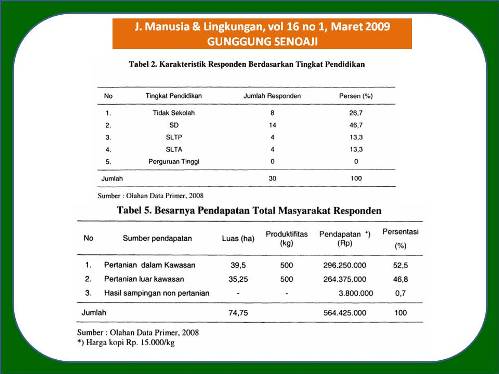
KONTRIBUSI HUTAN LINDUNG TERHADAP PENDAPATAN MASYARAKAT DESA DI SEKITARNYA: STUDI KASUS DI DESA AIR LANANG BENGKULU (Contribution of Protected Forest on Income People in The Village Surroundings: Case Study in Air Lanang, Bengkulu, Sumatera, Indonesia)
Gunggung Senoaji(1*)
(1) Jurusan Kehutanan Fakultas Pertanian Universitas Bengkulu
(*) Corresponding Author
Abstract
ABSTRAK
Hutan lindung merupakan kawasan hutan yang fungsi pokoknya sebagai perlindungan lingkungan. Kenyataannya banyak hutan lindung yang diolah masyarakat menjadi kebun dan rnenjadi salah satu sumber pendapatannya. Upaya pemerintah mengeluarkan masyarakat dari kawasan ini berarti akan mengurangi pendapatannya. Penelitian ini bertujuan untuk mengetahui besarnya pendapatan masyarakat yang diperoleh dari hutan lindung. Penelitian ini dilakukan di Desa Air Lanang, Bengkulu. Metode dasar yang digunakan adalah metode survey dengan teknik PRA. Data dan informasi yang dikumpulkan, dianalisis dengan analisis dekriptif kualitatif dan kuantitatif. Hasil penelitian menunjukkan bahwa bahwa jumlah penduduk desa adalah 1.460 jiwa (285 KK). 96% pekerjaannya sebagai petani, 60 % tingkat pendidikannya lulusan sekolah dasar. Tanaman kopi merupakan tanaman utama dan menjadikan prestise bagi pemiliknya. Luas lahan mereka sekitar 2,5 hektar di lahan milik dan kawasan hutan. Kontribusi pendapatan masyarakat dari kawasan hutan lindung ini sebesar 52,5 % dari total pendapatan. Ini berarti bahwa mengeluarkan masyarakat dari aktifitasnya di hutan lindung akan mengurangi pendapatannya sebesar 52,5 %.
ABSTRACT
Protected forest is a forest area as the main function of environmental protection. In fact many of the protected forest to be used to garden by people and become a source of income. Efforts of the government to remove as the people from this area will reduce their income. This study aims to determine the amount of income earned from the protected forest. Research was conducted in the Desa Air Lanang, Bengkulu. The research used descriptive method with quantitative and qualitative approach. Data was collected using participation-observation and opened-deepen interview. The result shows that the population of the village is 1460 people (285 families), 96% work as farmers, 60% level of education of primary school graduates. Coffee plants are the main crops and the prestige of the owner. Their area of about 2.5 hectares of property land and forest area. Contribution of people income from the protected forest area is 52.5% of total revenues. This means that the issue of community activities in protected forests will reduce the incomes of 52.5%.
Full Text:
ARTIKEL LENGKAP (PDF) (Bahasa Indonesia)Article Metrics
Refbacks
- There are currently no refbacks.
Copyright (c) 2017 Jurnal Manusia dan Lingkungan







